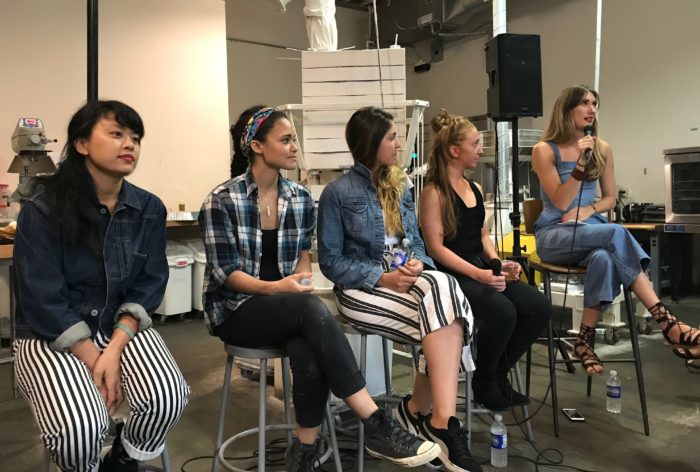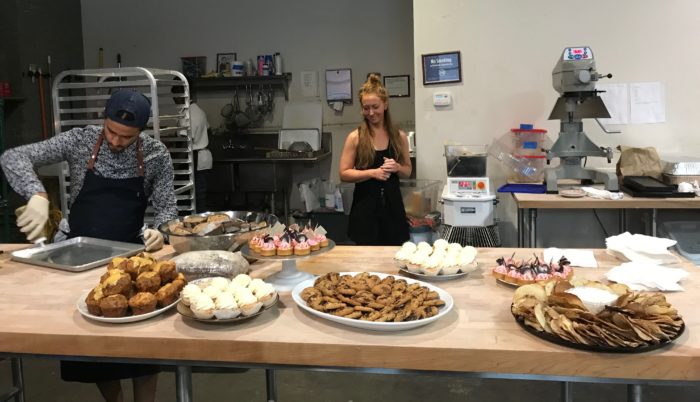Despite modern worries about carbs and gluten, the art of bread and pastry making is enjoying a renaissance. Brooklyn even has its own test-and-training kitchen, Brooklyn Bread Lab, owned and operated by the culinary team at the Williamsburg Hotel. Inside an East Williamsburg warehouse building is a fully-operational flour mill and baking facility, led by executive pastry chef Leah Morrow.
The lab was the venue recently for a gathering of women bakers and chefs for a conversation, “Women in Pastry,” about not only the nuances of baking but also what it means to be a woman in an industry where professional kitchens are often hostile work environments.
Joining Morrow for the conversation were Adriana Urbina (executive chef, De Maria), Mallory Cayon (executive sous chef, Sunday in Brooklyn), Dianna Daoheung (executive chef, Black Seed Bagels), and food writer Lisa Held as moderator. The chefs shared the wisdom they had gained in their careers, from the importance of having a culinary personality to the value of cooking school. Excerpts:
Define a Strong Identity
To build an identity as a pastry chef, one needs to have a distinctive touch. “We mill our own flour. I get to use a very raw ingredient that usually people do not have access to,” said Morrow (favorite pastry: bread). “It makes my pastries and breads different. It comes with challenges, but it gives a whole different dimensions to pastries and bread.”

At the Brooklyn Bread Lab conversation, from left: Dianna Daoheung, Mallory Cayon, Adriana Urbina, Leah Morrow and moderator Lisa Held (Photo by Angelica Frey)
Daoheung (favorite pastry: xiao long bao) is obsessed with baking over a wood fire. “When I start it, it brings me back to how original cooking got started. It really takes skill,” she said. “You really need to know the yin and yang behind the wood oven.”
Cayon (favorite pastry: chocolate chip cookies) has a background in pastry, but she spent the past four years in a savory kitchen, which influenced her art of dessert making. “Our desserts area little more savory; we have a big fermentation program that we try to weave into our desserts,” she said. “Our strawberry dessert has homemade strawberry vinegar that I make myself.”
Endorse Something Quirky
A unique baking philosophy needs to be implemented with detailed experimentation with off-the-map ingredients. Urbina believes in using fresh ingredients and paying tribute to her own Venezuelan heritage. Yucca, for example, is a very versatile ingredient, which she uses in savory, gouda-topped cauliflower buns and fried cakes. “The texture of the tapioca flour is amazing, it’s very malleable,” she said. And it’s gluten-free.

Leah Morrow oversees a spread of baked treats for the “Women in Pastry” event (Photo by Angelica Frey)
Daoheung endorses cricket flour. “People from the rest of the world eat bugs on a regular basis,” she said enthusiastically, adding that it thrills her to use something that disgusts some people and turn it into a delicacy. She is consulting with a company called Terreform One, which is growing crickets in the Brooklyn Navy Yard. The trickiest part? Making the texture is as glutinous as possible, since cricket flour is protein-heavy and very dense. The bread, in turn, is very nutty and flavorful.
Morrow, for her part, is intrigued by her experiments with algae such as agar, made possible by the equipment in her professional-grade bread lab. “Making gels and foams, I find it fascinating and people at home don’t get to do that.”
Don’t Be Hyper-competitive
While kitchens have become more nurturing environments in the past few years, with initiatives such as the newly minted #FairKitchens, it’s still not the easiest work environment. “It is tough working in a kitchen and being a female in a kitchen. You get unwanted attention, and you have to be strong enough to push through that,” Cayon acknowledged. “You have to show everyone that you’re as good as everyone else.”
How much personality and assertiveness is too much, though? “There’s a difference between having personality and being competitive, which is horrible,” said Urbina. “Having personality means speaking for yourself. You have to learn how to change your attitude to address a certain situation.” Finally, what sets a chef apart from a cook? “It’s the natural ability to lead,” said Daoheung “I am not a yeller, I am a teacher.”
Culinary School: Choose Wisely
While culinary school is a good building block to have on a resumé, especially for those who don’t have a lot of fieldwork experience, the cost is staggering. While Urbina attended culinary school, she did so in Venezuela, where the program is shorter and the cost far cheaper than in the U.S. “I learned ten times more working,” she said. “I recommend you start stage [an unpaid internship]. That way you’ll know if you like it. Going to culinary school is great, but very expensive. If you want that, you have to know that that’s what you want to do with your life.”
Cayon echoed that ambivalence, noting that she needed to go to culinary school because she was fresh out of high school. “The best way to learn is to get into restaurants.” By contrast, Daoheung, a career-switcher—she used to do marketing strategy–saw it as a necessary stepping stone. “School gives confidence, if you start from scratch,” she said. “It’s scary to walk into a kitchen and not know a single term. $50,000 later, you get that confidence.”